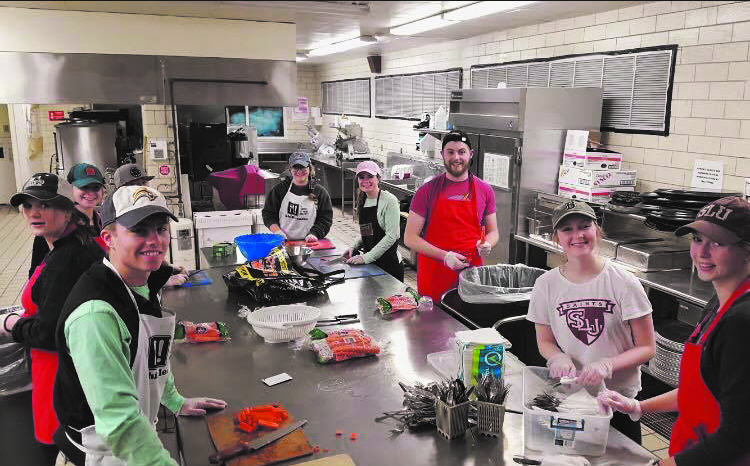I walk into the Eben Holden kitchen. I am confused. I cannot locate the refrigerator. I have never been in this space before and do not know where anything is. I eventually find it and ransack its contents, throwing out all the spoiled milk, old dressing, and past sell-by-date items.
I acquaint myself with the layout of the kitchen. It seems like organized chaos. Serving utensils, pots, pans, plates, silverware – they are all haphazardly placed in random locations on the shelves.
Reality begins to settle in. This is my summer. This is my office. I am in charge.
When my I first began my search for an internship this past summer, at the beginning of December 2017, I did not imagine that it would consist of prepping and serving a meal to upwards of 40 people on a weekly basis.
In lieu of my initial visions of an office building in the downtown of some metropolitan area, I returned to the site of St. Lawrence University in the rural North Country and spent the summer of 2017 as the Campus Kitchens Intern, cooking, serving, and cleaning dishes for the community of St. Lawrence County.
According to Watertown Daily News and Data USA, St. Lawrence County ties for the fourth poorest county in the state of New York, with 19.7 percent of its population living below the poverty line. There is great deal of need in St. Lawrence County, as so many residents earn a wage that cannot support the standard of living that most students at St. Lawrence enjoy.
Programs and services, like Campus Kitchens, that provide county members with a hot meal go a long way in buoying those members of the community who do not earn a livable wage or cannot cook for themselves. They are a mainstay of St. Lawrence County – many churches in the area have weekly meals as well – and are depended on by its members.
During the school year, Campus Kitchens (CKP) is run by student volunteers with the help of faculty advisor Ashlee Downing. When students depart for the Summer, CKP is left in sore need of volunteers and leadership, which is why they hire an intern – a person to plan and run the meals as well as recruit volunteers. Being the CKP Intern entails a lot of work and independence insofar as the intern must take on responsibilities that are normally spread between a leadership team of seven to eight people.
I was at first very nervous to undertake all this responsibility, but after a couple meals, I gained some confidence in my ability to effectively organize and serve a meal as well as an appreciation of the difficulty involved in preparing a meal for a large number of people. There is also no guarantee as to how many community members will come to a meal (there were close to 60 people during my second meal of the summer and only 35 the following week).
The uncertainty of whether or not I had prepared enough food for everyone who comes to the meal was somewhat unnerving. It was an element of the meal that I had not control over. Uncertainty is part and parcel of the CKP experience with each week bringing a new set of challenges and obstacles, whether that be a large number of guests, very few volunteers, or an uncooperative oven.
This is characteristic of the meal during the school year as well. Following my internship, I have assumed a position on the CKP leadership team, and these are some of the concerns that we deal with every week. Over the course of the summer, I learned to embrace these uncertainties and surrender to the chaos that sometimes prevails despite the best efforts of all those involved with the meal, also continuing to do so during the school year.
What makes the stress of every meal worthwhile is the experience of the communion and fellowship that occurs between the community members and student volunteers. There is a socio-economic divide between the upper middle-class students of St. Lawrence and the primarily working-class community of St. Lawrence County, making each meal, in some measure, a cultural contact zone.
What I noticed, during my time as the CKP intern and now, into my time as a leadership team member, is that students and community members are not daunted by their differences but rather enjoy each other’s company, eating together and engaging in playful conversation. It is my favorite part of every meal, being a part of this communion or even just being able to bear witness to it. It is what I would think of at the end of meals over the summer, when I found myself despairing at the prospect of having to wash so many dishes.



